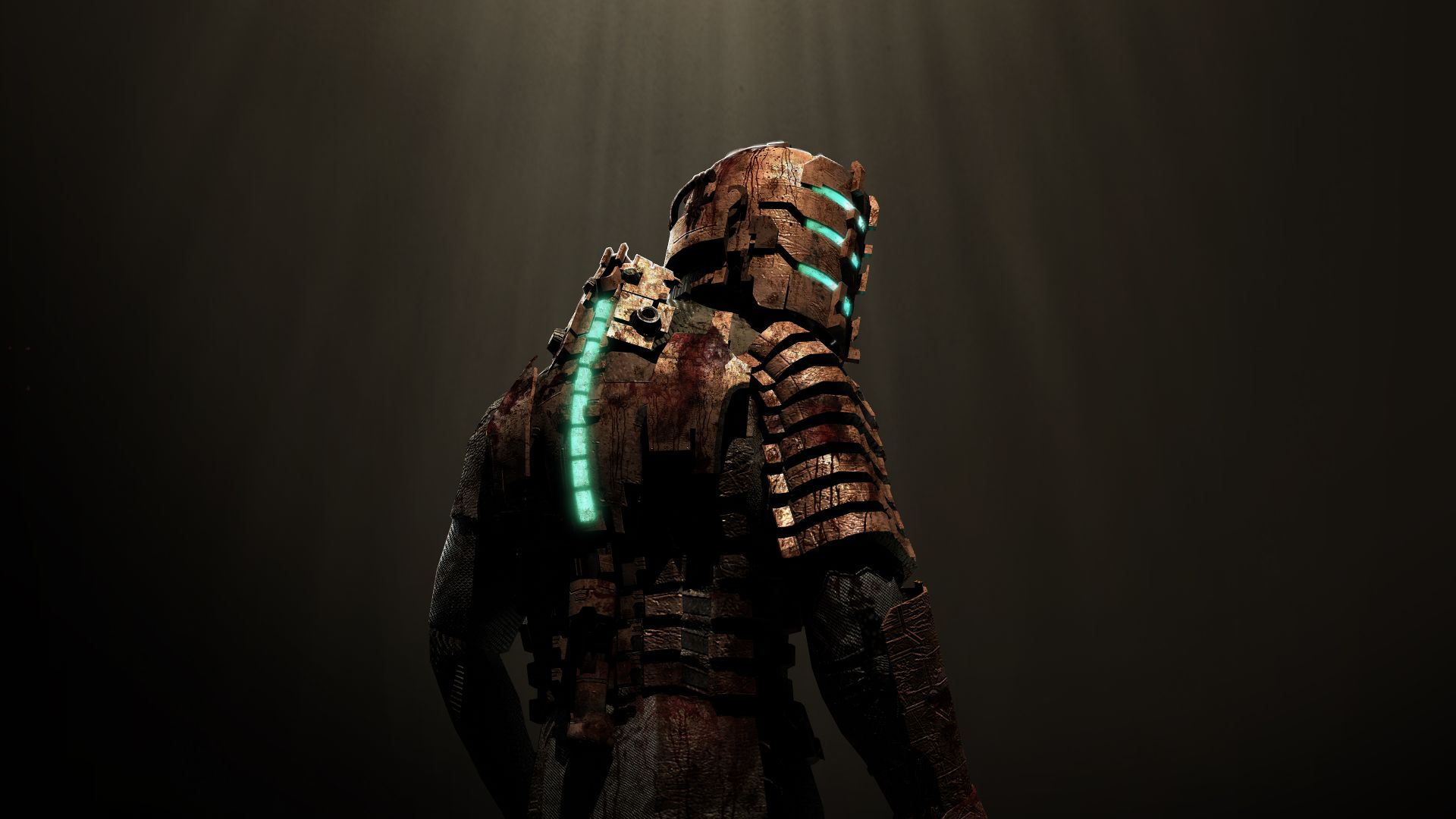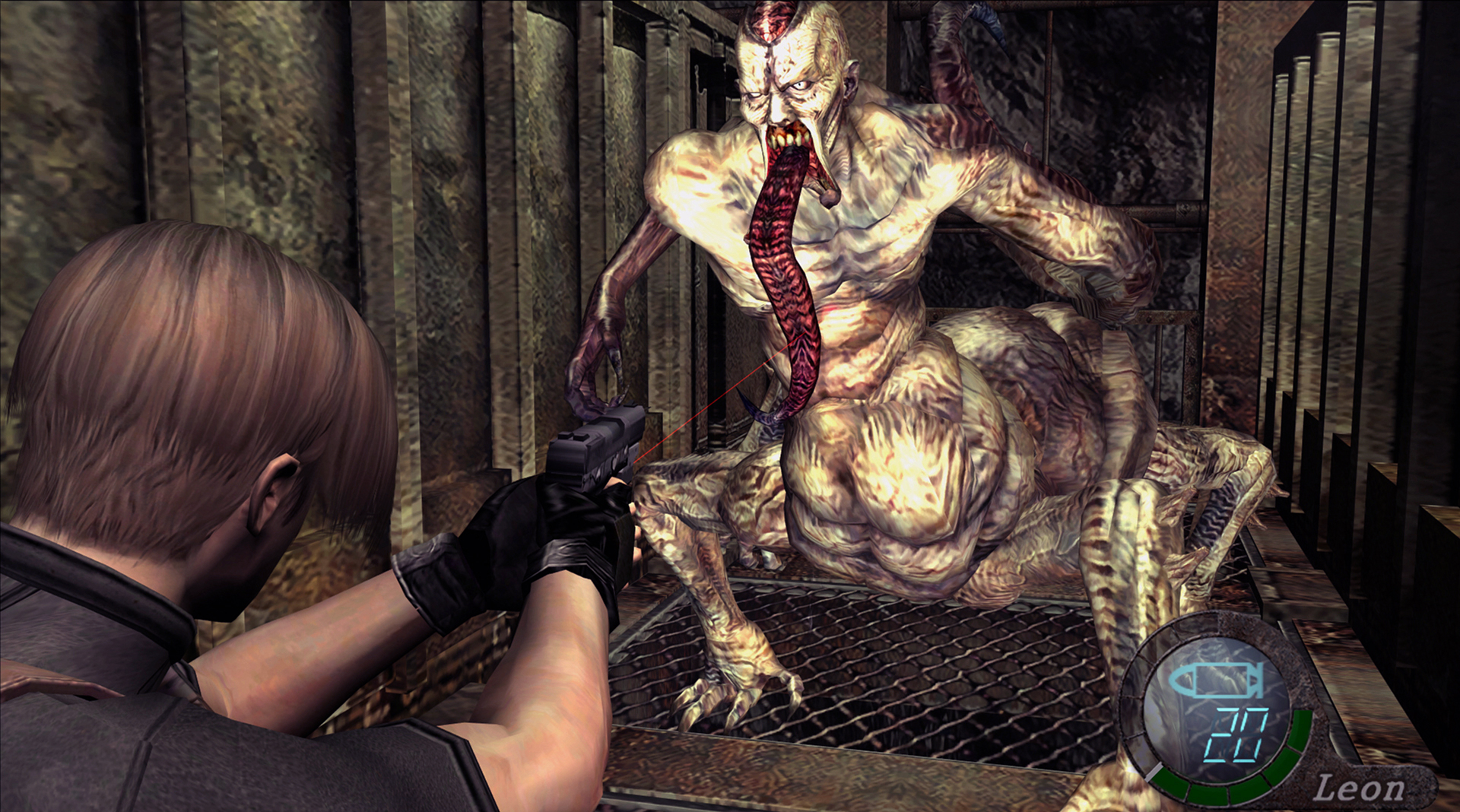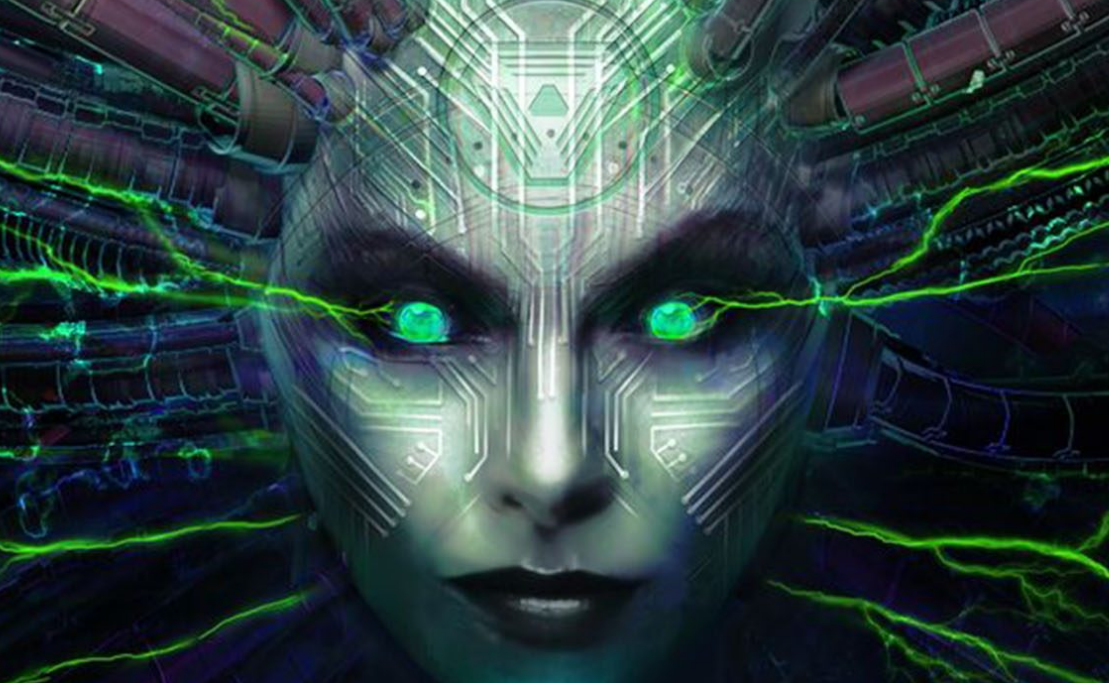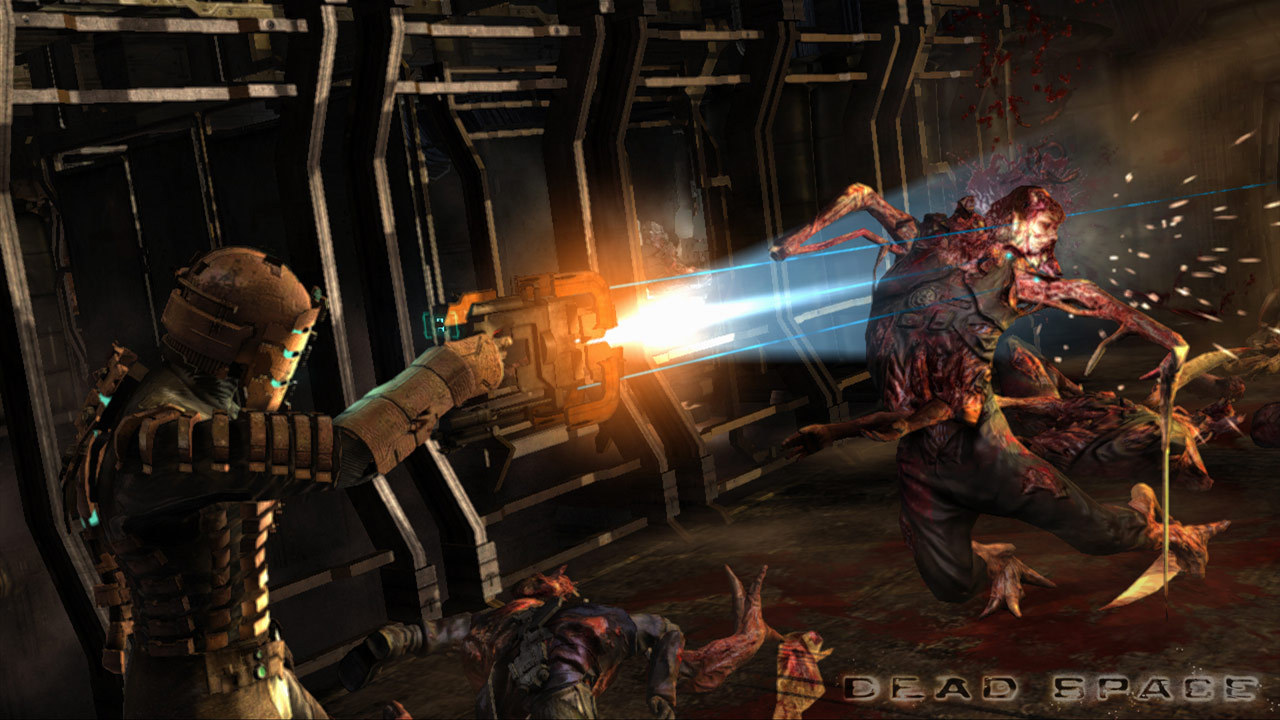
Resident Evil 4’s influence has become immeasurable since its release in 2005. Games like Gears of War and Uncharted owe much to the game that revolutionized third-person action controls. However, one popular sci-fi horror game would look a lot like an entirely different sci-fi horror game if not for Capcom’s reinvention of its seminal series. I got the opportunity to sit down with Dead Space designers Ben Wanat and Wright Bagwell to talk about the early days of development and how Resident Evil 4 helped them shape their own horror series out of another.
"When Resident Evil 4 came out, we were just awestruck by it," Wanat told me. "We were all playing it and we were like, 'Holy shit, this is a really awesome game. They're actually trying to tell a story; they've got some cool cinematics; the gameplay systems are fixing a lot of problems, bringing it into this action realm but keeping this intense horror feel to it. It was this amazing combination and—oh, the enemies were so freakin' cool."
Wanat didn't shy away from admitting that Resident Evil 4 is one of his favourite games of all time. And it's clear looking at Dead Space that he wasn't alone at EA Redwood Shores (later Visceral Games).
Then Resident Evil 4 came out and we were like, 'Oh. No, this is the shit.'
Ben Wanat
"It's pretty obvious when you play Dead Space, to look at it and go, 'Yeah, it's almost like they decided to make Resident Evil 4 in space,' which is exactly what we were doing."
A shock to the system
But it wasn't always that way. Early on in its development, before Resident Evil 4 had even been released, Dead Space was a completely different game. Rumours have circled around the sci-fi horror game's early days, reinforced by similarities found within Dead Space. During our discussions, Wanat confirmed them to me.
"Originally, we were pushing around this idea of maybe we could make System Shock 3. And you can look at the Dead Space blueprint and be like, 'Oh, this is kind of like System Shock,'" Wanat said, smiling.
"To do a System Shock 3, you're really tackling a monumental task, to make people happy with a sequel that wasn't made by the same team as the original," he explained. And while the game didn't make it out the door and live on as the third System Shock, Wanat said that a new entry in that series was the goal they shot for early on.
Keep up to date with the most important stories and the best deals, as picked by the PC Gamer team.
"It was like, 'Everybody, get your System Shock 2 copy, play it start to finish, and let's figure out what we're going to do,'" Wanat said, recalling the early days of development. "Then Resident Evil 4 came out and we were like, 'Oh. No, this is the shit.'"

However, Redwood Shores couldn’t just change the name of its project and work on something completely new.
"It was at a time at EA when there was no appetite for original IP. It seemed like everybody else was doing it except for us," Wanat lamented. While Redwood Shores created games based on James Bond, Lord of the Rings, and The Godfather, Wanat said the desire to make something original was fervent within the studio. And Resident Evil 4 was the catapult they needed.

So Dead Space isn't System Shock 3. No worries, it's still in development, and with a good chunk of the original team back on board, including famed game director Warren Spector.
"We were so hyped about Resident Evil 4 and we got obsessed with improving the mechanics," Wanat said. The team truly wanted to develop a first-rate survival-horror game. However, convincing EA to bet on an original idea wasn't going to be easy, and it was something that co-director Glen Schofield, now the GM of Sledgehammer Games, would work on for a long time. Schofield would break the ice on the idea, show some promising progress, and over time, slowly build the confidence EA needed to give the project a thumbs up.
"Eventually everybody accepted it, they saw how cool the things coming out of it were. That confidence continued to grow," Wanat told me. "Having that group there from the get-go and building this stuff without a greenlight was a little weird, but it's probably what got that whole thing working because we could all put our expertise into a pool and make something tangible.
"And once people saw that it was a real thing, they got it much easier than if you were trying to say, 'I want to make this totally scary-ass thing,' to which they'd look at their portfolio and say 'Nope, scary-ass thing is not in our language.'"
The executives weren't the only people impressed by the Dead Space demos. Wright Bagwell, who was working on another game at the time, played through one of these demo levels and was so enamoured with the experience that he absolutely had to work on the game.
I was like, 'No, I want to work on Dead Space or I'm going to quit.'
Wright Bagwell
"One of the level designers came over and said 'Hey Wright, we're testing this out. I want you to come into this dark room, I'm going to turn the lights off and turn the sound up really loud.' And we played through this demo level, and I remember feeling like I was going to shit my pants," Bagwell said, laughing.
"I was working on another game that got cancelled, and EA was trying to get me to work on something I didn't want to work on, and I was like, 'No, I want to work on Dead Space or I'm going to quit.'"
So Bagwell joined the Dead Space team, and at this point, it was starting to come together. Controlling Isaac was becoming a smooth experience, thanks to some of the big improvements to Resident Evil’s formula that the team was working on. Wanat specifically pointed out the ability to move while shooting. Despite the relatively simple-sounding nature of this change, it wasn't as straightforward as flipping a switch and letting someone walk around.
"I love in Resident Evil 4, the tension of not being able to move. But it caused a lot of problems for us to put movement in because we were making a new game," Wanat explained. "The enemies couldn't follow the same formula. It breaks a lot of the mechanics. We didn't know it was going to happen until we did it and were like, 'Oh, I think we broke something fundamental about the tension,' so we had to get it in other ways.
"It was like, 'It's a game changer. Let's embrace it and make this the best, polished survival shooter. Let's try to be the gold standard.'"
Space to grow
The move from System Shock 3's first-person view to the over-the-shoulder perspective that we know from Dead Space was something else that Wanat was increasingly happy about, as it allowed players to more easily care about Isaac.
"Even though Isaac didn't have a voice in the first game, seeing him and seeing him get grappled and eviscerated, I felt like there was a better chance to make a connection with the character. And that kinda gives the player a sense of who he is and the place he's in that we could have missed out on if we went the first-person shooter route and—man, we ripped off so much stuff from Resident Evil 4," Wanat stopped himself mid-sentence, laughing.
"But in a way, the modifications we made to the formula gave it its own style. Things like the outer space setting gave us a way to include new mechanics that weren't really available for the time and setting that Resident Evil took place in."

Dismemberment by way of plasma cutter, perhaps Dead Space's defining feature, was one such mechanic that joined the movement system to set itself apart from its Earth-based counterpart.
"It was very interesting to get those two things together and see that something special was taking shape," Wanat said. "But we do owe tremendously to Resident Evil 4. We were really big fans. We had so many of those water-cooler moments after that game came out."
Dead Space released in October of 2008 and was met with an overwhelmingly positive critical reception, in addition to sales of over two million copies. When Dead Space 2 was announced less than two years later, it was no surprise that EA wanted to push the series into a more action-focused direction to appeal to a wider audience. Bagwell moved into the creative director's chair, charged with a delicate balancing act of making sure there were moments of adrenaline-surging panic, but also time for the player to relax among the nameless horrors and dismembered limbs.
Despite its obvious inspirations, Dead Space had become its own thing. The studio was no longer praying at the altar of Resident Evil 4, but Wanat says there were some leftover influences that didn't make it into the first game.
"We didn't really have the ability to do any elaborate cutscenes," he explained. "I mean, we looked at Resident Evil 4, and we thought those were elaborate at the time. I love the intro. They're in the jeep, a guy goes to pee in the bushes, it's this really cool moment. And we couldn't really do those things, but we all wished we could. So in Dead Space 2, you get a lot more character moments and those over-the-top moments."
I think in Dead Space 3 we kinda destroyed what we had because we pushed too far on it.
Ben Wanat
Like its predecessor, Dead Space 2 garnered high praise from critics and, according to EA, sold nearly two million copies in its first week of release. However, that success wouldn't carry over to the third game. With less positive reviews and significantly less sales, Wanat, the creative director of Dead Space 3, expressed disappointment with how it closed out the series.
"I think in Dead Space 3 we kinda destroyed what we had because we pushed too far on it, but it was a deliberate decision in each of those instalments to make it faster, more relevant to a broader audience," he said. "It's a hard thing to do, to make a horror game have mass appeal. They're two diametrically opposed things."
Wanat and Bagwell went on to co-found Outpost Games, a developer that's currently working on a multiplayer survival game. Not much is known about their upcoming game, but the two designers wouldn't be surprised if Dead Space fans found some pieces of the sci-fi horror series woven throughout it. However, speaking to Wanat, it sounds like he's not quite done with survival-horror.
"Personally, I've got so much of that stuff in my system, that one way or another I will make another survival-horror game because I can't stay away from that kind of creative expression. That's just part of my DNA now."

